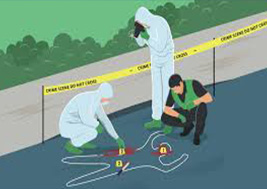Forensic Entomology
Forensic entomology is the study of insects/arthropods in criminal investigation. Right from the early stages insects are attracted to the decomposing body and may lay eggs in it. By studying the insect population and the developing larval stages, forensic scientists can estimate the post-mortem index, any change in position of the corpse as well as the cause of death. Although there are numerous possible applications of entomology to a legal investigation, the most common is to aid in the estimation of time since death. To an extent the succession of insects colonising a set of remains can give some indication as to how long the victim has been dead, as particular insects prefer to colonise a body at different stages in the decomposition process. However the most accurate means of establishing time since death using insect evidence is by studying insect life cycles.
In the earlier stages of decomposition, insect colonisation may highlight the sites of wounds. Flies tend to lay their eggs in natural bodily orifices such as the nose, mouth and ears, but they will also oviposit in wounds. Therefore maggot activity centred away from the natural orifices may suggest wounds are present, perhaps ones that were not immediately obvious.










.jpg)





















